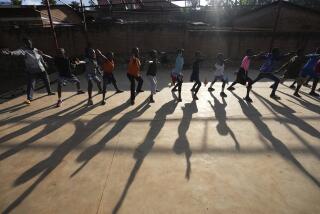U.N. Could Have Hindered Rwanda Killing, Panel Says
- Share via
PARIS — A Belgian legislative commission investigating the 1994 genocide in Rwanda is weighing strong evidence that U.N. peacekeepers in the Central African country could have prevented or at least hindered the extermination campaign but were thwarted by superiors at the world body’s headquarters in New York.
A key document in the panel’s investigation, according to a Belgian senator who is a member, is an urgent fax sent by the head of the U.N. peacekeeping force in Rwanda at the time, Canadian Maj. Gen. Romeo Dallaire, to his superior in New York, Maj. Gen. Maurice Baril, also a Canadian.
In the fax, dated Jan. 11, 1994, Dallaire reported that a highly placed Rwandan informant had given the U.N. force details of a plan by the Hutu extremist government that then ruled Rwanda to exterminate thousands of civilians, most of them members of the Tutsi ethnic minority. The informant also gave peacekeepers the locations of arms caches established to equip the Hutu militiamen who were to carry out the killings, according to the fax, a copy of which was obtained by the Washington Post.
Dallaire asked Baril for authorization to confiscate the arms caches and also to grant asylum to the informant and his family. But unnamed officials at the U.N. peacekeeping directorate refused to authorize the operation, Belgian Sen. Alain Destexhe said in an interview, asserting that it was not within the mandate of the peacekeeping force--a claim disputed by many familiar with the operation.
Less than three months later, Rwandan troops and militiamen began a bloody rampage in which more than 800,000 people were massacred, most of them Tutsis.
Meanwhile, Amnesty International said Wednesday that about 6,000 people--most of them unarmed civilians--have died recently as Hutus attempt to retake parts of Rwanda, and many were victims of reprisals by the Tutsi-led army.
Amnesty said it calculated the figure of 6,000 deaths based on reports from survivors, witnesses and the families of victims, some of whom are in exile.
Authorities say Hutu rebels bent on destabilizing the country have mixed with returning refugees or continue to attack from Congo, Rwanda’s western neighbor.
More to Read
Sign up for Essential California
The most important California stories and recommendations in your inbox every morning.
You may occasionally receive promotional content from the Los Angeles Times.










